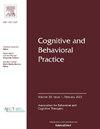Preliminary Investigation of the Influence of Treatment Regimen on Outcomes in Behavioral Parent Training
IF 2.9
3区 心理学
Q1 PSYCHOLOGY, CLINICAL
引用次数: 0
Abstract
Caregiver engagement and implementation of behavioral strategies are essential to effective interventions targeting childhood behavior problems. The aim of this preliminary investigation was to better understand caregiver decision-making when selecting different treatment regimens in an open trial format. Treatment packages included: (1) an intensive treatment program (ITP), involving a compressed 20-hour intervention occurring 2 hours per day for 10 days; and (2) a standard dosage treatment as usual (TAU) behavioral treatment program, involving weekly 50-minute appointments. Sixty-seven families with a child between 4–11 years old (M age = 5.82) with clinically significant problem behaviors self-referred to a hospital-based outpatient behavior therapy program. Results suggest that while caregivers chose a standard treatment regimen at a ratio of 2:1, compressed treatment (ITP) was associated with increased caregiver engagement and more significant reductions in child target behavior using both direct and indirect measures. Findings provide preliminary support for the use of high dosage treatment regimens as a means of increasing caregiver engagement and in the reduction of problem behavior in young children.
行为父母培训中治疗方案对结果影响的初步调查
照顾者的参与和行为策略的实施对于有效干预儿童行为问题至关重要。这项初步调查旨在更好地了解护理人员在以开放试验的形式选择不同治疗方案时的决策。治疗方案包括(1)强化治疗方案(ITP),包括为期10天、每天2小时的20小时压缩干预;(2)标准剂量照常治疗(TAU)行为治疗方案,包括每周50分钟的预约。67个家庭的孩子年龄在4-11岁之间(平均年龄为5.82岁),有明显的临床问题行为,这些家庭自我推荐参加医院的门诊行为治疗项目。结果表明,虽然照顾者选择标准治疗方案的比例为 2:1,但压缩治疗(ITP)与照顾者参与度的提高以及使用直接和间接测量方法对儿童目标行为的显著减少有关。研究结果为使用高剂量治疗方案作为提高护理人员参与度和减少幼儿问题行为的手段提供了初步支持。
本文章由计算机程序翻译,如有差异,请以英文原文为准。
求助全文
约1分钟内获得全文
求助全文
来源期刊

Cognitive and Behavioral Practice
PSYCHOLOGY, CLINICAL-
CiteScore
4.80
自引率
3.40%
发文量
118
审稿时长
84 days
期刊介绍:
Cognitive and Behavioral Practice is a quarterly international journal that serves an enduring resource for empirically informed methods of clinical practice. Its mission is to bridge the gap between published research and the actual clinical practice of cognitive behavior therapy. Cognitive and Behavioral Practice publishes clinically rich accounts of innovative assessment and diagnostic and therapeutic procedures that are clearly grounded in empirical research. A focus on application and implementation of procedures is maintained.
 求助内容:
求助内容: 应助结果提醒方式:
应助结果提醒方式:


